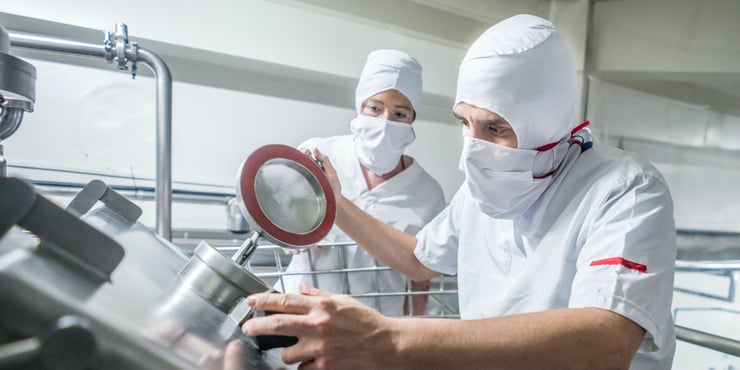The dairy industry is a highly competitive market. Not only are dairy processing plants competing with each other, but trends over the last two decades or so have increasingly put dairy at odds with the ever-growing plant-based market.
When you’re trying to do more with less and stay neck-in-neck with the competition, it’s vital to invest in the best possible equipment. Pressure may tighten margins and arteries, but it also provides an opportunity to innovate.
That’s why it’s vital for dairy plants to invest in high-quality industrial centrifuge equipment, and partner with industrial centrifuge manufacturers and maintenance companies that guarantee the highest quality service.
Keep reading to find out what benefits updated industrial centrifuges can provide to your dairy plant, and how to make the most of today’s technology to keep your dairy processing profitable.
What are your industrial centrifuge separators doing for you?
In their broadest definition, industrial centrifuges use centrifugal force to separate fluids of different densities at high speeds. In the dairy industry, industrial centrifuge equipment works by feeding raw milk (and other pre-processed liquids) into a rapidly spinning core at the heart of the centrifuge. The liquid is then separated and collected through independent outlets.
At most dairy plants, industrial centrifuges skim milk and separate the cream. They can also be used to clarify milk and whey, concentrate cream and butter, and help eliminate bacteria within raw milk (bactofugation).
It sounds simple until you realize that it's a lot of milk, and the applications vary. In a high-volume environment, the smallest issues can cause the biggest headaches.
Are your industrial centrifuges pulling their weight?
Industrial centrifuges are used for over 200 separate and specific applications across a myriad of industries. They come in an unending variety of capacities, filters, motors, CIP protocols, power consumptions… you get the picture.
All that to say, an industrial centrifuge is not a “one size fits all” piece of equipment.
Excellent reasons to examine whether or not your current industrial centrifuge is suiting your needs include:
- Changes in processing — Has your production focus or product shifted?
- Problems with efficiency — Are you noticing worrying variability in product quality?
- Aging — Is your industrial centrifuge equipment just plain out of date?
- Automation — Are you taking advantage of recent innovations in automation, or are you still reliant on time-consuming manual protocols?
A “yes” to any of these indicates that you urgently need to reexamine your current industrial centrifuge equipment.
We know the barriers to upgrading.
Because industrial centrifuges are usually manufactured to spec by the OEM, they are… not cheap (to put in mildly). They are not mass-produced like other industrial processing equipment, and the barriers to upgrading are manifold.
This is why it’s so important to find the right industrial centrifuge(s) for your plant. A new or upgraded system can mitigate many issues with downtime, product quality, and utility expenses.
Updated industrial centrifuge equipment will:
- Maximize separation efficiency and yield across applications
- Guarantee the highest level of separation quality with regular maintenance
- Reduce your waste and pollution
- Lower your operating and maintenance costs
- Utilize automation in order to reduce inefficiencies, downtime, and labor costs
The best leaders are long-term thinkers. An investment in better equipment is an investment in the future of your plant.
Remanufactured industrial centrifuges reduce upfront and operational costs.
When upgrading your industrial centrifuges, choosing remanufactured equipment like Separators offers instead of new equipment has some pretty big advantages.
First off, a new, custom-built industrial centrifuge can take over a year to get to your plant. Remanufactured equipment can get to you significantly faster, meaning you’ll increase your efficiency and decrease downtime much quicker.
Secondly, a remanufactured industrial centrifuge costs, on average, 30% less than a brand new equipment. That’s a huge savings on a piece of equipment that is, in all respects, like new.
Separators’ remanufacturing process includes a full disassembly of all parts, to ensure that every bolt, spring, disc, and valve is in tip-top shape. Everything is cleaned, and if anything doesn’t meet our standards, it’s repaired or replaced.
For every remanufactured industrial centrifuge, you’ll also receive an educated estimate of its water, air, and utility consumption upfront, so that you can pre-calculate your operational costs.
Replacement is not your only option.
If a full replacement is prohibitive, or you are simply looking to update underperforming equipment that is otherwise functional, we also offer full remanufacturing of your industrial centrifugal separators. Sending your centrifuge to our shop can extend its lifespan by a number of years, and guaranteed recalibrated and efficient functionality.
In an emergency? We know that unexpected equipment downtime can cost you tens of thousands of dollars an hour. That’s why we answer emergency calls 24/7 and dispatch our team of expert technicians at the drop of a hat.
If your industrial centrifuge is in need of specific replacement parts, we also provide same-day shipping on our extensive inventory.
It’s not just about the mechanical side.
While routine maintenance and up-to-date industrial centrifuge equipment are vital to the bottom line of your plant, it’s worth taking a look at your employees and automation as well.
If employee education has fallen by the wayside, it can be as damaging to your industrial centrifuge equipment as misadjusted valves or a wobbly bowl.
Consider turning your workforce into your own army of inspectors by bringing in Separators’ consulting service for customized training. We share sneaky tricks of the trade when powering up and shutting down industrial centrifuge equipment, and help your employees understand best practices for CIP procedures.
Lastly, you may wish to upgrade the automation of your entire system. This tech has grown exponentially over the last five years, and can have an extremely beneficial impact on your productivity, eliminating inefficiencies and downtime.

